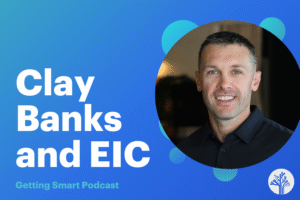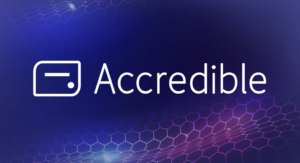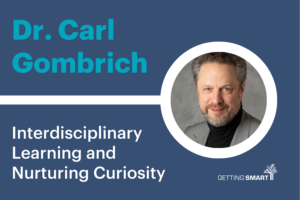CompetencyEd And Why Everyone Should Learn To Code

Melinda Barlow
The speed of progress in the 21st century has almost surpassed our capacity to exist in a functional way within it. Traditional models like time-based learning are not equipping us for the future we are hurtling towards that requires everyone, especially students, to demonstrate mastery in flexible learning environments. A foundation of literacy in reading, writing, and arithmetic are no longer enough. The need for students to improve their tech fluency, to learn to code, and to be capable and competent at navigating the digital world is unquestionable. Education must organically deliver informed and skilled people into the workforce in ways it previously has not. We must also ensure that students are prepared to be lifetime learners.
Many of the students of today will be far better equipped for their futures than any generation before them. Education reform has a lot to do with this of course, but credit must also be given in some capacity to GenDIY. Emerging from classically designed learning models into the blinding glare of the skills gap; their tenacity in the face of unemployment has delivered countless success stories and evidence that there ARE other ways. Armed with traditional postsecondary credentials and the prospect of dozens of jobs they are educated for, but not quite skilled enough for, they seek out a design course, a web development course, or any other skills they require; to get the job they actually want.
The wheels are in motion and new learning systems are forging a different path. One that is built on the adoption of Common Core Standards as a more dynamic and flexible approach to learning. However the transition from cohort to competency education is entirely dependent on our capacity to fully engage with digital personal learning. This in turn is dependent on learning platforms being designed in ways that attract us rather than burden us. High fees and the need to purchase and transport cumbersome text books for an online course do not make for satisfied students. There is some irony in being asked to reference a textbook for a web development course. Or to read a ‘learn to code’ manual which was out-dated before it even went to print.
These kind of transitional issues need to be eliminated quickly as digital literacy rates increase. GenDIY is familiar with solving problems quickly, simply and online. If they find a job they want and are missing a necessary skill, they can choose from a multitude of one of many online learning options. Platforms such as Udemy, CareerFoundry and General Assembly offer adaptable, supportive online training in everything from digital marketing to user experience design, web development courses to data analysis training.
Every one of the skills taught by coding is essential for our students’ success in the 21st century. Every single student needs to learn to code as much as they need to read, write and count. Students need to think and function in ways that engage creativity and promote dynamic and flexible exchange. They need to be able learn and apply new concepts and be able to apply skills into their day-to-day life. Current cohort style education teaches foundation subjects but not necessarily essential skill-sets related to technology, healthcare, finance and communication. A competency based education approach offers more focused learning possibilities with the individual student in mind.
Students are involved in the development of their learning goals and understand their purpose. This motivation ensures a stronger commitment, and better engagement in the ongoing customization of their education and subsequently their career. It also allows for better preparation for the transition from school to college to career as the plans have already been in the making for some time.
Initiative is the order of the day and the 1 page CV, listing skills gained through consecutive years at one company will soon become a thing of the past. GenDIY are designing their own careers, experiencing much more job satisfaction and in many cases earning a lot more money than their traditional career choice originally promised them. Flexible working schedules include regular freelance clients, work on fixed contracts for longer term projects and even part-time positions as an ‘in house freelancer’. Cumulatively these offer social interaction, greater opportunities for creative collaboration and most importantly job diversity – something the ‘gold watch career’ could never do.
As the cohort to competency learning transition gains traction, surely a new generation will evolve that will transcend GenDIY. They will transition seamlessly through customized learning options, leveraging technology and innovation as their drivers and discover new ways to engage in lifelong learning.
For more information on CompetencyEd, check out:
- Next Gen Higher Ed: Blended, Personalized & Competency-based
- Flexible Learning Time Provides System Approach to Differentiation in a Competency Education School
- Vocab Lesson: “Competency-Based Learning”
Melinda Barlow is an Australian freelance writer and editor, based in Berlin. Find Melinda on Twitter at @melindajbarlow.
Udemy and General Assembly are portfolio companies of Learn Capital where Tom Vander Ark is a partner.








Brian Silberberg
It's great to encourage kids to utilize useful skills like coding, to prepare them to innovate in the world ahead. At Books That Grow we're committed to a similar mission. Our app provides a library of reading materials, each of which can be read across multiple reading levels, so all students can be accommodated simultaneously. See more at http://www.booksthatgrow.com/